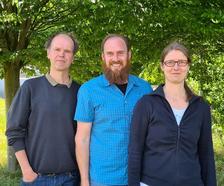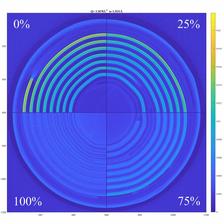They are among the XRD-CT Pioneers: Martin von Zimmermann, Olof Gutowski and Ann-Christin Dippel (from left). (Photo: DESY)
The “XRD-CT Pioneers”, winners of the Analytical Science Horizon Prize 2023 awarded by the Royal Society of Chemistry are featured in a newly published video. The clip showcases the outstanding achievements in the structural imaging technique called X-ray diffraction computed tomography (XRD-CT) by the British firm Finden Ltd. in collaboration with researchers from PETRA III at DESY and other academic and industrial partners.
Conventional X-ray CT methods are widely applied for medical diagnostics, screening of vital airplane parts and non-destructive probing of archaeological artefacts. In principle, they combine a series of radiographs into a 3D image. This image depicts the object’s interior based on absorption contrast but without direct correlation to chemical composition. XRD-CT on the other hand raster-scans a specimen and adds a dimension to the information space in the form of a diffraction pattern in each pixel of the reconstructed image. These data reveal the spatial distributions of the chemical components and their atomic structure inside an object.
As one pillar of the success, Finden’s and DESY’s experts have been working together at PETRA III beamline P07 to push the frontiers of XRD-CT in terms of speed and accuracy towards fast measurements of large objects and devices during live operation and efficient image processing based on AI. “Our mutual interests to tease out the best conditions for DESY’s users and Finden’s clients is driving the innovations at P07 in most fruitful collaborative efforts” says DESY researcher Olof Gutowski, responsible for the XRD-CT program at the beamline, and adds: “We are excited to go for ever new advancements.“ Gutowski is one of the DESY awardees, together with Ann-Christin Dippel and Martin von Zimmermann.
The video that outlines the essentials of XRD-CT and the developments leading up to the prestigious award is available online. More details on the prize and the winning team is found on the webpage of the Royal Society of Chemistry.
(from DESY News)








